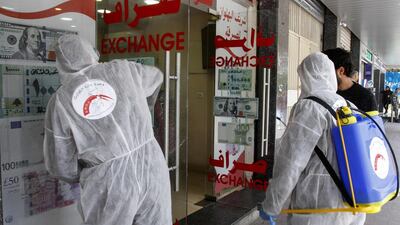The outbreak of coronavirus in Lebanon, where a third death was announced on Thursday, is stretching a healthcare system already suffering shortages of medical supplies caused by the country's liquidity crunch.
“We have an acute shortage. We are trying to use what is available very carefully,” said Sleiman Haroun, head of the Syndicate of Private Hospitals. “If there are no imports of fresh [medical] supplies, we will not be able to manage for more than a week.”
Figures for imports in the past three months are not yet available but experts say they dropped significantly as the dollar crunch worsened. The US currency, which is necessary to secure goods from overseas, has gradually disappeared from the local market as Lebanon grapples with the worst economic crisis in its history.
Importers must buy dollars on the black market, where they cost up to 60 per cent more than the official rate. A support mechanism set up last October for three sectors – medicine, health and fuel – has not helped to ease the crunch.
“The situation is deteriorating rapidly,” said Salim Adib, a professor of epidemiology and public health at the American University of Beirut. “Bigger hospitals will probably run out of supplies faster than smaller ones.”
Mr Haroun said only 250 of the 850 ventilators in the country were available to treat patients suffering from the Covid-19 virus. About 10 per cent are missing parts and the rest are used for patients suffering from other diseases.
According to Mr Adib, the number is adequate for now since the country only had 65 coronavirus cases as of Thursday and only 5 per cent of patients on average are placed in intensive care treatment and require a ventilator. That means that there would need to be more than 5,000 cases of coronavirus for the country to run out of ventilators.
“Projections are still not clear. My hunch feeling is that Lebanon will not go above 200 cases, but I do not have the mathematical modelling to be sure of that,” said Mr Adib.
Meanwhile staff at the government-run hospital treating most of the Lebanon's Covid-19 cases went on an indefinite strike on Thursday.
The action by a significant number of the 950 employees at the Rafic Hariri Hospital in Beirut was in protest against the lack of government support in dealing with the outbreak and its failure to deliver on a pay increase promised in 2017, said Samer Nazzal, who works in the hospital's finance department.
The strike does not apply to staff dealing with coronavirus, cancer and dialysis patients and emergency cases, he said.
Employees are demanding that the hospital administration and the Health Ministry sanitise the building, including the floors. This has been done in other government institutions such as Parliament, but not in public hospitals. Administrative staff also want to be provided protective measures such as sanitising gel and masks, said Mr Nazzal.
The World Health Organisation does not recommend the use of masks for healthcare workers unless they are in the same room as a coronavirus patient, but Mr Nazzal said it was difficult to gauge who was contaminated in the hospital.
“Patients walk in all the time asking where they can get tested for coronavirus. This is very risky. How can I protect myself [from them]?” he said.
Other measures considered to be conducive to the spread of Covid-19, such as fingerprint readers to clock in and out of shifts, must be stopped, said Mr Nazzal.
A Health Ministry representative was not immediately available for comment.
In case of a rapid spread of the virus, as has happened in several countries, there is little hope of Lebanon receiving international help, Mr Haroun said.
“Who is going to send medical supplies and personal protection equipment when they are needed all over the world?”














